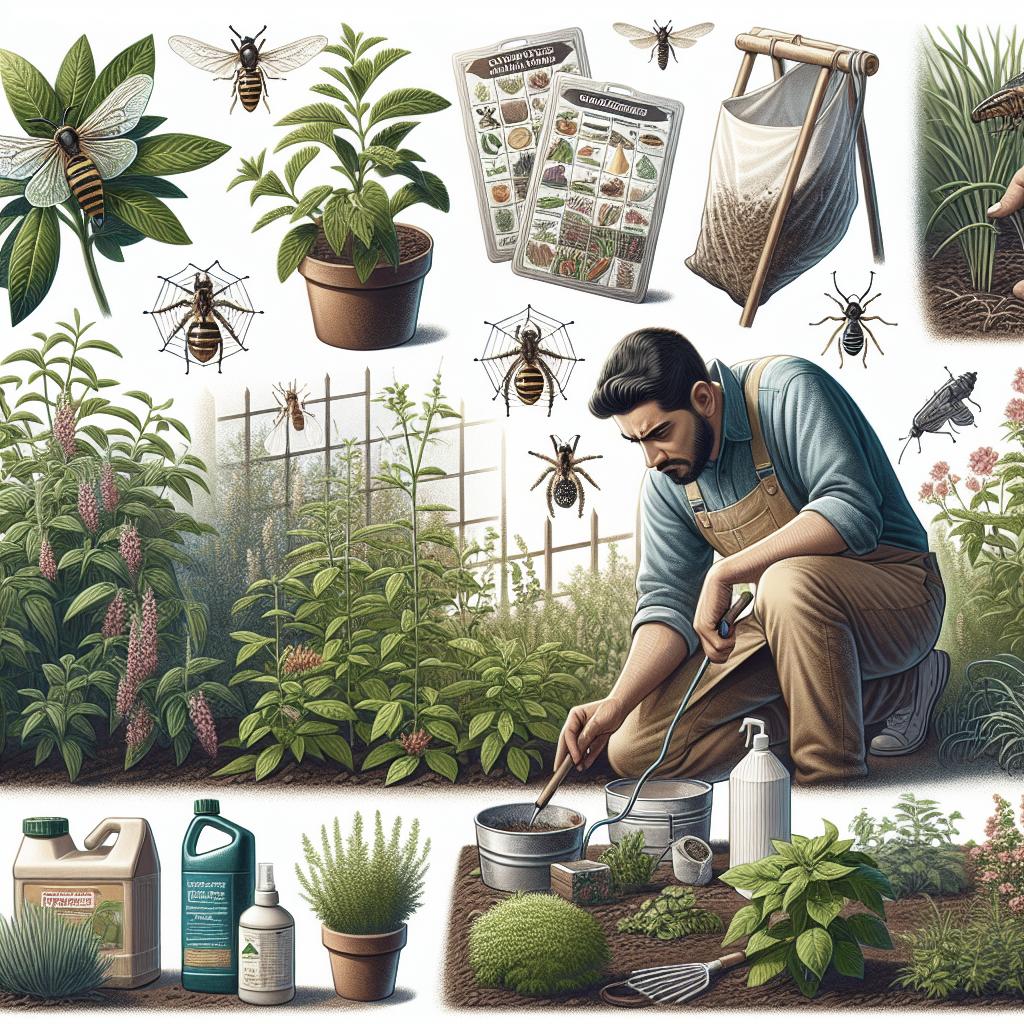“`html
Understanding Organic Pest Control: Sustainable Solutions for Gardeners
The growing demand for sustainable agriculture has amplified interest in organic pest control methods. Utilizing natural mechanisms and eco-friendly techniques, these methods offer a promising alternative to chemical pesticides. In this blog post, we delve into the world of organic pest control, exploring various examples and their implementations. We will also address the challenges faced by farmers in adopting these methods, recommend the best organic pest control practices, and highlight the importance of these strategies in preserving ecological balance. Through this exploration, readers will gain a comprehensive understanding of organic pest control’s principles and practices, making it easier for them to implement these methods in their own gardens or farms.
What Are Organic Controls?
Organic controls refer to pest management methods that leverage natural processes and materials to reduce or entirely avoid the use of synthetic chemicals. This approach is fundamentally about working with nature rather than against it, using the natural biology of pests and their predators to create a balanced ecosystem. These methods are not only sustainable but also vital for environmental preservation, as they minimize the harmful impact of conventional pesticides on non-target organisms including beneficial insects, wildlife, and humans alike.
Essentially, organic pest control strategies aim to manage pest populations through the use of ecological and biological knowledge. This includes understanding pest life cycles, predator-prey relationships, and environmental factors that influence pest presence. These techniques, while often requiring more knowledge and precise management, offer a more sustainable solution that focuses on prevention rather than eradication, leading to healthier crops and reduced chemical residue.
What Is An Example Of Organic Control?
Biological Controls
Biological control uses living organisms to control pest populations. Natural enemies of pests—such as predators, parasitoids, or pathogens—are introduced, encouraged, or conserved in the ecosystem. Ladybugs, for example, are frequently used because they prey on aphids, a common plant pest. Similarly, the introduction of nematodes can control soil-dwelling insect larvae. The application of biological controls not only aligns with organic principles but also minimizes the need for chemical interventions, promoting a balanced ecological system.
The effectiveness of biological controls rests on understanding the interactions between pests and their natural enemies and requires careful monitoring and management. By enhancing the habitat to support these natural predators, farmers can sustain pest control over the long term. This reduces the environmental impact and prevents the issues of pest resistance seen with chemical controls.
Crop Rotation and Companion Planting
Crop rotation is the practice of growing different types of crops in the same area across different seasons or years, which confuses pests that depend on specific plants, disrupting their life cycle. This method not only reduces pest populations but also enhances soil fertility and structure. Companion planting, on the other hand, involves growing certain plants together to deter pests naturally. For example, planting basil alongside tomatoes can repel tomato hornworms, while marigolds can deter nematodes.
These methods support organic farming principles by creating diversity in plant communities, which in turn supports diverse insect populations. The diversity makes it harder for pests to thrive and can even attract beneficial insects that prey on the pests. Effective planning and knowledge of plant-insect interactions are essential to maximizing the benefits of these practices.
Mechanical Controls
Mechanical controls involve the use of physical barriers or manual methods to remove or exclude pests. Techniques such as hand-picking, trapping, and using nets or row covers can effectively manage pest populations without chemicals. Applying mulch not only suppresses weed growth but can also deter pests like slugs and snails.
While mechanical methods can be labor-intensive, they offer an immediate and targeted solution, especially useful for small-scale gardens or farms. The timing of these interventions is crucial; for instance, row covers should be applied early in the season to prevent insect pests from accessing crops altogether.
Cultural Controls
Cultural controls are preventive measures that reduce pest establishment, reproduction, dispersal, and survival. Practices like timed planting, careful sanitation, and proper maintenance of crops can play a significant role in managing pests organically. Ensuring optimal plant health through adequate watering and nutrition often prevents pest outbreaks, as healthy plants can better resist pest pressures.
By adjusting crop management techniques, such as avoiding overcrowding that can encourage fungal infections, cultural controls create an environment less conducive to pests. These practices require careful observation of pests and plant health and may involve adjustments based on local conditions, but they form the backbone of an effective organic pest control strategy.
What Are Barriers to Implementing Organic Pest Control?
One of the main barriers to implementing organic pest control is the level of knowledge and expertise required to effectively apply these methods. Understanding biological processes and pest life cycles demands significant time investment and education, which can be daunting for farmers accustomed to conventional chemical treatments. Many growers may also be wary of the consistency and reliability of organic methods due to a lack of immediate and visible results.
Additionally, some organic control practices may demand higher initial costs and more labor input than their chemical counterparts, leading to reluctance from growers concerned with short-term economic viability. There may also be regulatory restrictions and market challenges that limit the use of certain biological control agents or materials, making access to effective organic options inconsistent.
What Is The Best Organic Pest Control Recommended And Why?
One of the best-recommended organic pest control strategies is integrated pest management (IPM). This approach combines multiple pest control methods, including biological, mechanical, and cultural practices, tailored to the specific ecosystem and crop conditions. IPM focuses on long-term prevention and sustainability, aiming to manage pest damage economically and with the least possible risk to people and the environment.
IPM’s adaptability to a wide range of crops and environments, alongside its customizable nature for various pest pressures, makes it a leading choice. By emphasizing careful monitoring and using thresholds to determine when action is necessary, IPM minimizes costs and environmental impact, reduces resistance issues, and promotes healthier ecosystems and crops.
What Is The Importance Of Organic Pest Management?
Organic pest management is essential not only for preserving the biodiversity and health of agricultural ecosystems but also contributes significantly to human health safety and environmental conservation. By minimizing synthetic chemical use, it reduces toxic runoff into water bodies and protects soil health, promoting sustainable and resilient agricultural systems.
Additionally, organic pest management supports the preservation of beneficial insects like pollinators, which are crucial for ecosystems and food production. By maintaining ecological balance, organic practices yield healthier and more nutritious produce, often demanded by health-conscious consumers. These methods align with growing consumer preferences for sustainably produced food, potentially enhancing market opportunities for farmers.
Summary
Organic pest control presents a sustainable, eco-friendly alternative to conventional insecticides, promoting healthier ecosystems and food safety. While the transition may pose initial challenges, the long-term benefits of implementing strategies such as biological control, crop rotation, and integrated pest management outweigh these barriers. Organic methods are vital in reducing environmental impact, protecting non-target organisms, and providing sustainable solutions for pest management.
| Aspect | Details |
|---|---|
| Organic Controls | Utilize natural processes for pest management; safe for non-target species. |
| Examples | Biological controls, crop rotation, companion planting, mechanical methods, cultural controls. |
| Barriers | Lack of expertise, higher costs, market challenges, inconsistent access to resources. |
| Recommended Method | Integrated Pest Management (IPM) for its sustainability and adaptability. |
| Importance | Supports biodiversity, reduces chemical residues, aligns with consumer demand. |
“`

